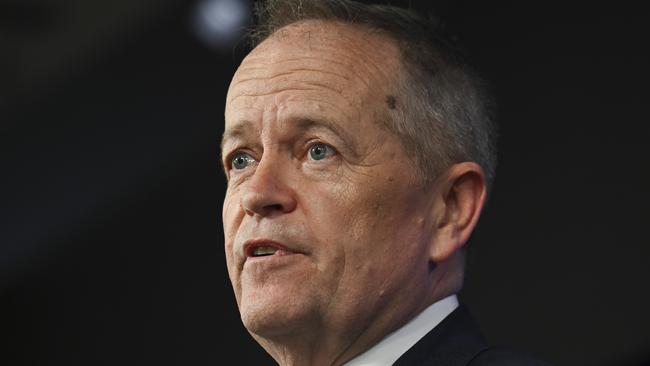Bill Shorten warned of NDIS service cuts
Bill Shorten’s strategy to rein in the cost of the $40bn-a-year NDIS has come under attack from major disability providers catering for 30,000 recipients.

Bill Shorten’s strategy to rein in the cost of the $40bn-a-year NDIS has come under attack from major disability providers catering for 30,000 recipients, warning they may have to cut services as Labor faces growing opposition to its scheme overhaul.
A warning from 12 major not-for-profits that they are being “rendered unsustainable” by a fifth year of zero indexation comes as Labor faces demands from peak disability groups that it pause the progress of its landmark NDIS legislation, which would help the government meet its target of reducing the scheme’s annual growth from about 15 per cent to 8 per cent by 2026.
With the government’s budget strategy reliant on reforming the NDIS, Mr Shorten has also been urged by state premiers to delay the new laws – expected to get through with Coalition support – because of a “decided lack of detail” over funding arrangements.
The legislation, likely to pass the Senate this week, would limit the services to be claimed under the NDIS, with the government still needing to strike a deal with the states on new “foundational supports” programs to cater for people who no longer qualify for the scheme.
In a letter to Mr Shorten and his agency’s executives, one of the government’s key NDIS consultation groups, the Disability Representative Organisations, said changes being proposed would “cause significant harm” to disabled Australians and were “completely out of step with the spirit and intent of the NDIS”.
The organisations said they could not support the proposed list of items that would be covered or carved out of the NDIS, as they were “highly problematic, ill thought through” and “not fit for purpose”.
On the same day the letter was sent to Mr Shorten’s office, the delegation of 12 not-for-profits, employing more than 1500 allied health and behaviour support staff, met with one of the minister’s representatives to warn they would struggle to continue offering their services without a temporary NDIS supplement or workforce training program.
“Government rightly is focused on total scheme costs, and it sounds like a good idea to freeze prices, but five years on, it’s now shaping a very different market and the NGOs are wondering if we’re part of that,” Aruma chief executive and former NDIS board director Martin Laverty said.
“We do early childhood intervention and it is that environment in which we’ve seen the pressure the most acute. As states and territories are working through foundational supports, we are concerned that if (this) takes too long, services will have dried up.”
Mr Shorten said there “was more money than ever being invested in personal disability support budgets through the NDIS than anywhere else in the world per capita”.
“While I respect not-for-profits are feeling the pinch of competition, the price guide currently doesn’t differentiate between long-established service providers and new service providers,” he said.
“The NDIA board recently approved this year’s annual pricing review recommendations and resolved to do immediate work for the first time on ensuring pricing factors in quality for services. The strengthening of the NDIS pricing model aims to ensure we have a provider market that delivers quality supports and value for money for participants.”
Northcott chief executive Liz Forsyth said her organisation worked with children to assess their developmental delay, before sending them down a path to get an NDIS plan or receive “early intervention supports”.
“Some of this work has been happening in our organisations for over 100 years. That’s the loss. There’s a whole capability … that is really squarely in that foundational support space,” she said.
Mr Shorten has stated in the past that there needed to be a “conversation in Australia about helping kids with milder forms of developmental delay who don’t need to be on the NDIS”, following figures showing 12 per cent of all boys in Australia aged five to seven were now on the scheme, many with autism or a developmental delay.
The not-for-profit organisations also warned their ability to provide training to students was being compromised, which put at risk a workforce that would be critical to the new system of foundational supports running alongside NDIS-funded services.
Benevolent Society chief executive Lin Hatfield Dodds said the organisations provided the whole disability and care sector with a “supply” of highly trained workers, but she was beginning to ask: “How long we can keep directing fundraising and endowment funds into subsidising commonwealth funding?”
“The Benevolent Society announced two or three weeks ago that we were divesting from our support co-ordination and allied assistance work, which has made us all incredibly sad. So $6m of NDIS services that no longer exist,” said Ms Hatfield Dodds, a former Prime Minister and Cabinet social policy director.
A sector-wide survey last month revealed nearly three-quarters of care providers for disabled Australians were considering shutting their doors, with recent price increases being described as “insufficient” in keeping up with their costs and leaving them financially unviable.








To join the conversation, please log in. Don't have an account? Register
Join the conversation, you are commenting as Logout